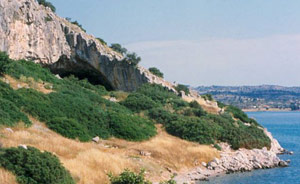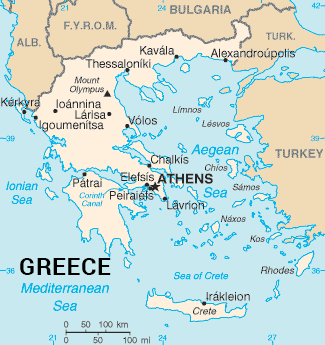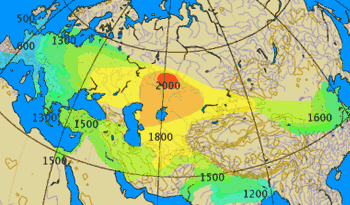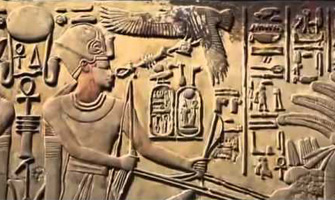
Archaic Greece:
The Dark Age and a New Dawn
John Rapkin, illustrator, Wikimedia Commons
“From there we sailed with heavy hearts, and came to the land of the Cyclopes, a lawless, aggressive people, who never lift their hands to plant or plough, but rely on the immortal gods.… The Cyclopes have no council meetings, no code of law, but live in echoing caves on the mountain slopes, and each man lays down the law to his wives and children, and disregards his neighbours.”
Book IX, Homer’s The Odyssey

Evidence of very early settlement on the Greek Islands comes from the Franchthi cave, overlooking the Argolid Sea in the Peloponnese. Occupied from about 20,000 BCE through the Mesolithic and Neolithic periods, this cave contains some of the earliest evidence of agriculture in Greece.
Hunter-gatherers were probably its first inhabitants, but from around 11,000 BCE non-native food, such as almonds and lentils appear, and obsidian items from this cave have been found on the island of Melos 80 miles away by sea. Even this early, these island peoples were involved in long-distance sea travel. Around 6000 BCE, evidence of domesticated animals and plants appears in the archaeological record at the cave, and large fish bones indicating deep sea fishing. The cave was apparently abandoned in about 3000 BCE.

Greek Dark Age: Circa 1200–Circa 800 BCE
The political and military collapse in Mycenaean Greece around 1200 BCE was devastating. It is likely that a combination of events contributed to it: earthquakes, which were frequent in the region, drought due to climate change, the migrations of barbarians (these were foreigners—not barbarians in the way we now understand the word), plus invasion and civil war.

War in these times meant maintaining hundreds of chariots and their associated horses to use as battle taxis and as a means of bearing drivers and archers. Armies also employed light-armed infantry men, trained in the mountains and woods, who served kings and lords as mercenaries, and as “runners,” killing victims injured by the charioteers.
It seems likely that these javelin-throwing, fleet-footed soldiers, seeing their chance, decided to take things into their own hands. An orgy of slaughter, looting, and destruction may well have followed where cattle, women and wealth were plundered. The chariot’s inability to fight on uneven terrain, plus the shift to infantry, neutralized its use not only in the Aegean, but in effect rendering the chariot an outmoded weapon over much of the ancient world, after 400 years of supremacy.
The success of war thereafter depended on every man playing his part, an attitude that may well have stimulated a spirit of independence and of individual responsibility—useful prerequisites for the social and political changes that would eventually follow.
All the palaces, except Athens, were sacked and burned. Since these citadels held all the arts, written records, and the riches associated with their long-distance trade, a period of illiteracy and poverty took over with no written records or monuments to tell us much. The rise of servile populations, workers, farmers etc., caused additional internal upheaval. Dorian Greeks, who had been a part of the lower classes, the serfs, farmers and laborers of the Mycenaean world, may also have been joined by others from north-western Greece, Macedonia and Epirus. In any case, the inhabitants were overwhelmed and the entire social order collapsed.
From about 1200 BCE, the Mycenaean population had virtually disappeared from the region. Some people possibly hid up in the hills and mountains, perhaps becoming herdsmen. Using temporary housing, wearing animal skins and owning little, they left us no archeological trace. Some fled overseas to western Anatolia, or along the shores of the eastern Mediterranean; some may have joined itinerant fighters such as the Sea Peoples.
From about 1200 BCE, judging from archaeological sites, the Mycenaean population had virtually disappeared from the region.
Anarchy and poverty spread over the entire Greek world, which virtually obliterated any memories of the two civilizations: the Minoans and Mycenaeans. Things were so extreme that the survivors were left with at best a dreamlike memory of their past.
But this complete break with the past and with all connection to it eventually would enable the Greeks to develop a new civilization that will move out in directions quite different from elsewhere in the region.
The Greek kingdoms in the Aegean probably suffered most because they were in the most remote area of the region.
External Stories and Videos


Secrets of the Aegean Apocalypse
The History Channel
Around 1200 BC, an ancient Armageddon destroyed nearly every known civilization. What could have caused it? The theories are many, but most now include one mysterious and massively destructive factor—a force only the Egyptians survived to name: The Sea People.
